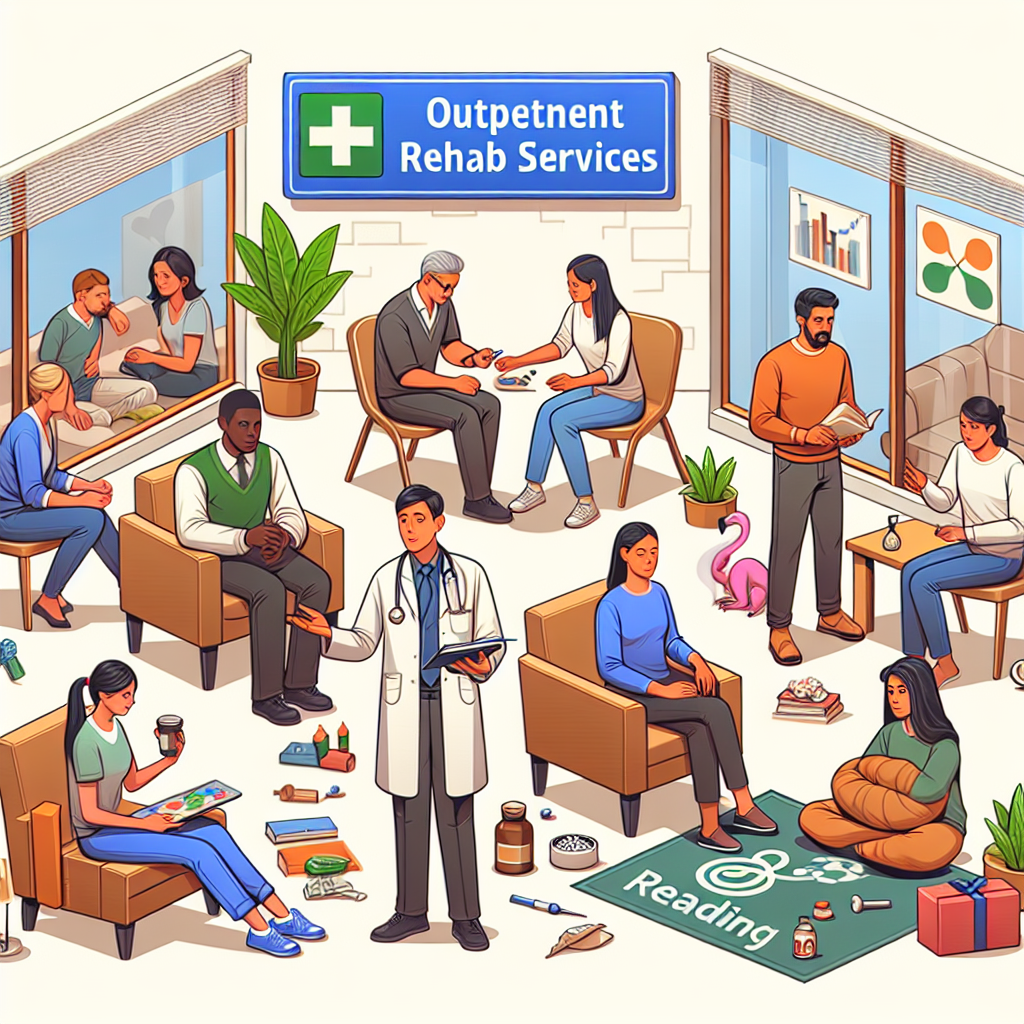-
Table of Contents
“Outpatient Heroin Rehab: Flexible, Effective Recovery with Real-Life Integration.”
Introduction
Outpatient heroin rehab offers numerous benefits for individuals seeking recovery from heroin addiction. One of the primary advantages is the flexibility it provides, allowing patients to maintain their daily responsibilities such as work, school, or family commitments while receiving treatment. This type of rehab typically involves scheduled therapy sessions, counseling, and support groups, which can be tailored to fit the individual’s schedule. Additionally, outpatient rehab is often more cost-effective compared to inpatient programs, making it accessible to a broader range of people. The support network built through outpatient programs can also be crucial for long-term recovery, as it helps individuals integrate coping strategies and healthy habits into their everyday lives. Furthermore, outpatient rehab allows patients to apply the skills they learn in real-time, fostering a practical and immediate approach to overcoming addiction.
Comprehensive Care in Outpatient Heroin Rehab: A Path to Recovery
Outpatient heroin rehab offers a comprehensive approach to recovery that can be both effective and empowering for individuals seeking to overcome addiction. One of the primary benefits of outpatient rehab is the flexibility it provides. Unlike inpatient programs, which require individuals to reside at a treatment facility, outpatient rehab allows participants to maintain their daily responsibilities, such as work, school, and family commitments. This flexibility can be crucial for those who cannot afford to take extended time away from their lives but still need structured support to combat their addiction.
Moreover, outpatient heroin rehab programs are designed to provide a wide range of therapeutic services that address the multifaceted nature of addiction. These services often include individual counseling, group therapy, and educational workshops. Individual counseling sessions offer a safe space for participants to explore the underlying causes of their addiction, develop coping strategies, and set personal goals. Group therapy, on the other hand, fosters a sense of community and shared experience, which can be incredibly motivating. Participants can draw strength from the support of their peers, knowing they are not alone in their journey.
In addition to these therapeutic services, outpatient rehab programs often incorporate holistic approaches to treatment. These may include mindfulness practices, yoga, and nutritional counseling, all of which contribute to overall well-being. By addressing the physical, emotional, and psychological aspects of addiction, outpatient rehab provides a more comprehensive path to recovery. This holistic approach not only helps individuals break free from the grip of heroin but also equips them with the tools needed to lead healthier, more balanced lives.
Another significant advantage of outpatient heroin rehab is the opportunity for real-world application of learned skills. Because participants continue to live in their own environments, they can immediately apply the coping mechanisms and strategies they acquire during treatment. This real-time application can be incredibly beneficial, as it allows individuals to navigate the challenges of daily life with the support of their treatment team. Should they encounter difficulties, they can discuss these experiences in their therapy sessions and receive guidance on how to handle similar situations in the future.
Furthermore, outpatient rehab programs often emphasize the importance of building a strong support network. This network can include family members, friends, and other individuals in recovery. Many programs offer family therapy sessions to help repair and strengthen relationships that may have been strained by addiction. By involving loved ones in the recovery process, outpatient rehab fosters a supportive environment that can be crucial for long-term success.
It is also worth noting that outpatient heroin rehab can be more cost-effective than inpatient treatment. The reduced financial burden can make it a more accessible option for many individuals. This affordability does not come at the expense of quality, as outpatient programs are staffed by experienced professionals dedicated to helping participants achieve lasting recovery.
In conclusion, outpatient heroin rehab offers a comprehensive and flexible approach to overcoming addiction. By providing a range of therapeutic services, incorporating holistic treatment methods, and allowing for real-world application of skills, these programs empower individuals to reclaim their lives. The emphasis on building a strong support network further enhances the likelihood of long-term success. For those seeking a path to recovery that accommodates their daily responsibilities and provides robust support, outpatient heroin rehab can be an invaluable resource.
Flexibility and Support: Key Benefits of Outpatient Heroin Rehab
Outpatient heroin rehab offers a unique blend of flexibility and support, making it an increasingly popular choice for individuals seeking recovery. Unlike inpatient programs, outpatient rehab allows patients to maintain their daily routines, including work, school, and family responsibilities, while receiving the necessary treatment. This flexibility is particularly beneficial for those who cannot afford to take extended time off from their obligations. By integrating treatment into their everyday lives, patients can apply the skills and strategies they learn in real-time, fostering a more seamless transition to a drug-free lifestyle.
Moreover, outpatient rehab provides a robust support system that is crucial for long-term recovery. Patients have access to a network of healthcare professionals, including therapists, counselors, and medical staff, who offer continuous guidance and encouragement. This ongoing support helps individuals navigate the challenges of recovery, reducing the risk of relapse. Additionally, outpatient programs often include group therapy sessions, where patients can share their experiences and learn from others who are on a similar journey. This sense of community can be incredibly empowering, as it reminds individuals that they are not alone in their struggles.
Another significant advantage of outpatient heroin rehab is the opportunity for personalized treatment plans. Since patients are not confined to a facility, they can receive care that is tailored to their specific needs and circumstances. This individualized approach ensures that each person receives the most effective treatment possible, whether it involves cognitive-behavioral therapy, medication-assisted treatment, or a combination of methods. By addressing the unique aspects of each patient’s addiction, outpatient rehab can lead to more successful outcomes.
Furthermore, outpatient rehab often proves to be more cost-effective than inpatient programs. The reduced financial burden can make treatment more accessible to a broader range of individuals, ensuring that more people have the opportunity to seek help. This affordability does not come at the expense of quality; outpatient programs are designed to provide comprehensive care that addresses both the physical and psychological aspects of addiction. By making treatment more accessible, outpatient rehab plays a crucial role in combating the opioid crisis and helping individuals reclaim their lives.
In addition to these practical benefits, outpatient heroin rehab also promotes a sense of autonomy and empowerment. Patients are encouraged to take an active role in their recovery, making decisions about their treatment and setting personal goals. This sense of ownership can be incredibly motivating, as it reinforces the idea that recovery is a personal journey that requires commitment and effort. By fostering a sense of independence, outpatient rehab helps individuals build the confidence and resilience needed to maintain long-term sobriety.
Lastly, the integration of family and social support in outpatient rehab cannot be overstated. Family members and loved ones are often included in the treatment process, participating in therapy sessions and educational programs. This involvement helps to rebuild trust and improve communication, creating a more supportive home environment for the patient. The inclusion of family and friends not only strengthens the patient’s support network but also helps loved ones understand the complexities of addiction and recovery.
In conclusion, the flexibility and support offered by outpatient heroin rehab make it a highly effective option for individuals seeking recovery. By allowing patients to maintain their daily routines, providing personalized treatment plans, and fostering a sense of community and autonomy, outpatient rehab addresses the multifaceted nature of addiction. Additionally, its cost-effectiveness and emphasis on family involvement further enhance its appeal. For those ready to take the courageous step towards recovery, outpatient heroin rehab offers a promising path to a healthier, drug-free life.
Q&A
1. **Flexibility and Convenience**: Outpatient heroin rehab allows individuals to maintain their daily responsibilities, such as work, school, or family commitments, while receiving treatment. This flexibility makes it easier for patients to integrate recovery into their everyday lives.
2. **Lower Cost**: Outpatient rehab programs are generally less expensive than inpatient programs because they do not require the costs associated with residential care, such as housing and meals. This makes outpatient rehab a more affordable option for many individuals seeking treatment.
Conclusion
Outpatient heroin rehab offers several benefits, including flexibility in scheduling, allowing individuals to maintain work, school, or family responsibilities while receiving treatment. It provides access to support networks and resources within the community, fostering a sense of normalcy and continuity in daily life. Outpatient programs are often more cost-effective than inpatient options, making them accessible to a broader range of individuals. Additionally, these programs can offer a variety of therapeutic approaches, including individual counseling, group therapy, and medication-assisted treatment, tailored to meet the specific needs of each patient. Overall, outpatient heroin rehab can be an effective and adaptable option for those seeking recovery while maintaining their everyday commitments.



